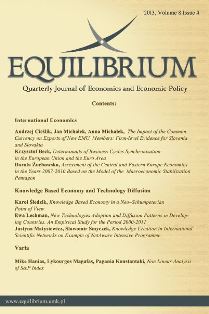THE IMPACT OF THE COMMON CURRENCY ON EXPORTS OF NEW EMU MEMBERS: FIRM-LEVEL EVIDENCE FOR SLOVENIA AND SLOVAKIA
THE IMPACT OF THE COMMON CURRENCY ON EXPORTS OF NEW EMU MEMBERS: FIRM-LEVEL EVIDENCE FOR SLOVENIA AND SLOVAKIA
Author(s): Andrzej Cieślik, Jan Jakub Michałek, Anna MichałekSubject(s): Economy, Supranational / Global Economy
Published by: Instytut Badań Gospodarczych
Keywords: common currency; export; new EMU members
Summary/Abstract: There are many studies aiming at estimation of aggregate trade effects of the euro adoption by the old EU countries, which are based on the augmented gravity model. In contrast to the existing literature, we investigate whether the adoption of the common currency increases the export activity of individual firms. In particular, we refer to the new strand in the trade theory literature, based on the Melitz (2003) model, in which export performance depends on labor productivity and costs of exporting. There are already many empirical studies, based on firm level data, showing the relevance of the Melitz (2003) model. Most of those studies demonstrate that export performance positively depends on firms’ characteristics such as labor productivity, spending on R&D, age of the firm, the stock of human capital or propensity to innovate, but they do not take into account the impact of the common currency on the cost of exporting. There are only few studies analyzing trade implications of euro adoption for firms’ exports of “old EU” members. In our empirical paper we use the firm level data basis set up by the EBRD and the World Bank for Central and Eastern European Countries. Using the probit model, we analyze whether the accession of Slovenia and Slovakia to the Eurozone did increase the firms’ propensity to export in those countries.
Journal: Equilibrium. Quarterly Journal of Economics and Economic Policy
- Issue Year: 8/2013
- Issue No: 4
- Page Range: 7-23
- Page Count: 17
- Language: English

